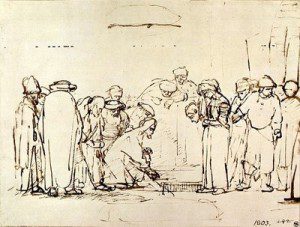Let’s start with this, from Terry Pratchett, in Carpe Jugulum. This is a conversation between Granny Weatherwax and a man named Mightily Oats:
“… And sin, young man, is when you treat people as things. Including yourself. That’s what sin is.”
“It’s a lot more complicated than that …”
“No. It ain’t. When people say things are a lot more complicated than that, they means they’re getting worried that they won’t like the truth. People as things, that’s where it starts.”
“Oh, I’m sure there are worse crimes …”
“But they starts with thinking about people as things … ”
We could’ve chosen a similar statement from Kant or John Rawls or dozens of other eminent moral philosophers — the idea here is not original to Granny Weatherwax or to Pratchett. But this is clear, concise and to the point: “Sin … is when you treat people as things.” It is, to borrow a phrase from another of Pratchett’s wise crones, a nice and accurate definition of sin. It’s straightforward, it’s non-sectarian, and it works.

There may be more to say on the subject,* but any such “complications” would be derived from this starting point, not exceptions to it. Anything more we want to say about sin — about ethics and morality and oughts and shoulds and right and wrong — can be built atop this foundation. And if we want to say something more that doesn’t seem to agree with this, then we have a hint that something may be amiss with what we’re trying to say.
That last point is why people like Granny Weatherwax are upsetting to people like Mightily Oats — to anyone who bases their claim to authority and power on a sectarian rulebook. It’s not that such religious experts in the law would quite want to say that treating people as things is necessarily ever good or right or acceptable. But they’ve got a lot invested in all their commandments, particularly in those that may seem odd or arbitrary, and all that they have invested in that seems threatened when someone comes along and offers a simple principle that seems to make all of their lawyerly expertise redundant. Even worse, such principles call into question some of the rules and commandments themselves — those rules that don’t seem to have anything at all to do with treating people as things, and especially those rules and commandments that seem to require treating people as things.
(This is why Jesus got in trouble for having the audacity to summarize all the law and the prophets in a simple Golden Rule. Paul wouldn’t have been quite so dangerous a troublemaker if he’d been content to argue that “love is obedience to the law,” but he didn’t stop there. He said “love is the fulfillment of the law” — the culmination and consummation, the end of it. He was replacing the latter with the former in a way that threatened every institution, tradition, authority, career and identity that was based on the latter.)
And but so, let’s start here, with this: “Sin is when you treat people as things.” And let’s consider what this suggests about sex and marriage and the relationship between those two things.
I would guess at this point that some of my friends who advocate/enforce a traditional, authoritative set of rules for sexual morality are getting nervous and perhaps a bit defensive. They’re probably worried that I heading toward a discussion in which I will question the rule that says sex can only be moral within the context of traditional marriage.
But I’m afraid it’s worse than that. What interests me here is not the question of whether or not sex can only be moral within the context of traditional marriage, but the question of whether it is possible for sex to be moral within that context at all.
Spoiler alert: I am married, and I would not have gotten married if I did not believe that it was possible to do so without treating people as things. Nor would I have bothered getting married if I did not believe that doing so can be one helpful way of structuring life to guard against the potential for treating people as things. But the qualified, conditional nature of that endorsement seems unlikely to be very reassuring to my traditionalist friends.
– – – – – – – – – – – –
* Cruelty to animals, for example, is a kind of sin — a kind of wickedness — that may take a bit more considering to line up with this starting point of a definition. But I don’t think it amounts to an exception.











